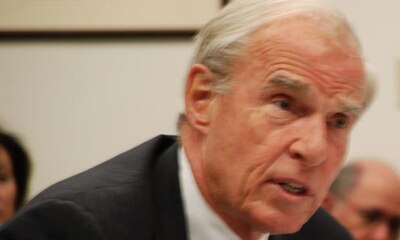“Let me be clear, CU-Boulder does not want to be privatized,” University of Colorado President Bruce Benson told a legislative study committee Friday.

Benson had been asked to respond to comments made by Denver lawyer Herbert Fenster made in late July to the Long-Term Fiscal Stability Commission, a legislator-citizen panel that is studying the state’s fiscal structure.
Fenster, who has ties to CU, said the Boulder campus is languishing as a state institution and strongly suggested it be privatized (see story).
Benson said even though Boulder now gets a minority part of its support from state taxes, state support and tuition are important, and “We’re not going to solve all our higher educations problems with deregulation.”
The university was created by the state constitution, Benson noted, so privatization would require voter approval to amend that document. He also noted that there would be the tricky problem of transferring valuable state property to a new private university.
Just to be sure, panel chair Sen. Rollie Heath, D-Boulder, asked Benson, “Privatization is not an acceptable alternative to you?”
“That’s correct,” the president replied.
In his usual, rapid-fire way, Benson held forth for 45 minutes, telling the panel about the efficiencies and cuts the CU system has instituted, his feelings about those cuts (“We’re cutting to the bone now”) and the challenges facing the state’s higher ed system. “We’ve got some really big problems ahead of us.”
State support of colleges, battered by the first recession at the start of this decade, has taken a bigger hit in the current downtown. Higher ed spending is being held stable only with the help of federal stimulus funds, which will go away in 2011. Tuition rates have risen steadily, shifting the burden of college costs to students and parents, although Colorado tuition remains lower than that of most state systems.
Benson repeated a conceptual proposal he’s made on other occasions, saying colleges need greater freedom to operate their campuses. Those include being able to set their own tuition and financial aid levels, exemption from various state financial rules, freedom to do their own real estate deals and flexibility in enrolling foreign students.
Such flexibility wouldn’t endanger access for Colorado students, he said. “We’re our own policeman. We’re not going to limit kids.”
That assertion was challenged, albeit in a friendly way, by panel member Sen. John Morse, D-Colorado Springs. “One man’s bureaucracy is another man’s accountability,” he noted.
Benson said, “Don’t let the perfect be the enemy of the good,” but added, “I’m not asking to not be held accountable.”
The commission also heard a lengthy presentation – and had lots of discussion with – Jim Polsfut, chair of the Colorado Commission on Higher Education, and Inta Morris, interim director of the Department of Higher Education. (A missing presence at Friday’s meeting was former DHE chief David Skaggs, who resigned recently. He left because of unspecified differences with Gov. Bill Ritter. But, those differences were believed to revolve around a pending higher ed strategic plan, the approach to which Skaggs and Benson differed on.)
Polsfut and Morris – with a supporting cast of DHE staffers – laid out statistics about how Colorado higher ed spending compares with other states, the minority graduation gap and many other trends. (See earlier story, “Stats give stark view of higher ed challenges”.)
The commission has been asking state agencies to suggest what sort of spending would be required for “ideal” programs.
Morris pointed to studies by the National Center for Higher Education Management Systems that have found comparable peer institutions in other states have budgets about $750 million higher than Colorado spending.
But, Morris noted, spending that much more a year would get Colorado only to the “average” of what other states spend.
Morse asked, “You’re suggesting we dare to be average? What do the excellent states do?”
The panel also heard from Kay Norton, president of the University of Northern Colorado, and Nancy McCallin, president of the Colorado Community College System.
McCallin noted that community college enrollment is up 20 percent this fall, putting further pressure on a system financially stressed system.
Do your homework
